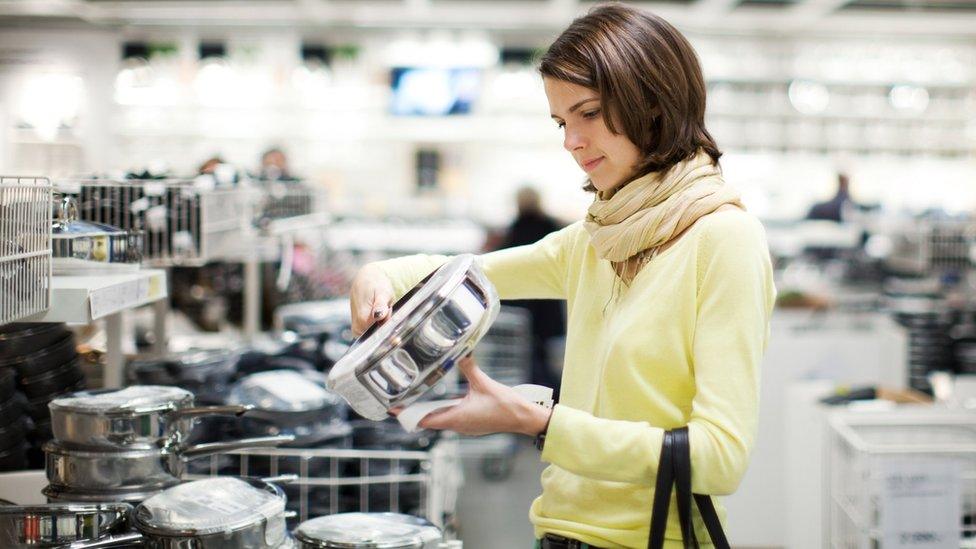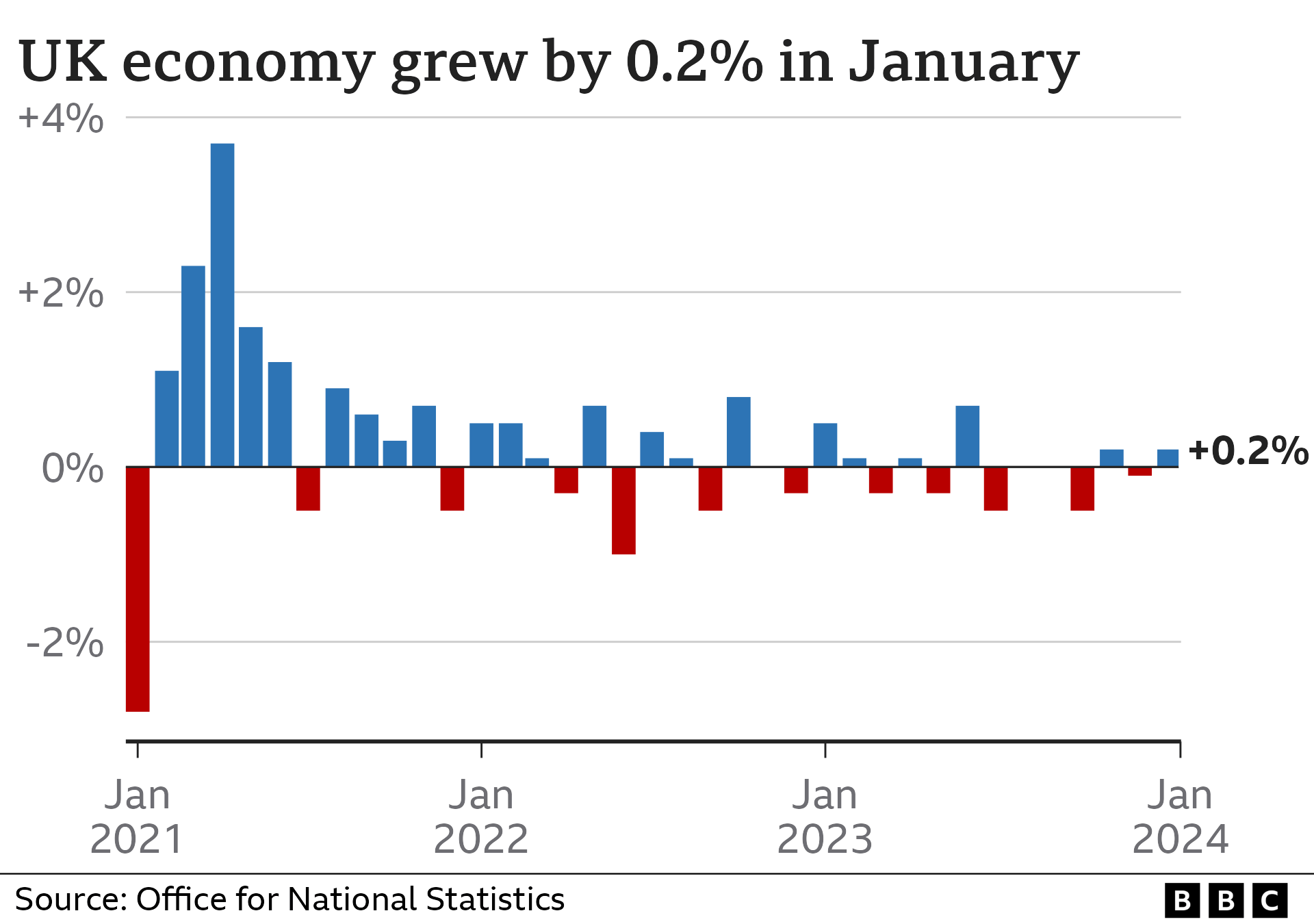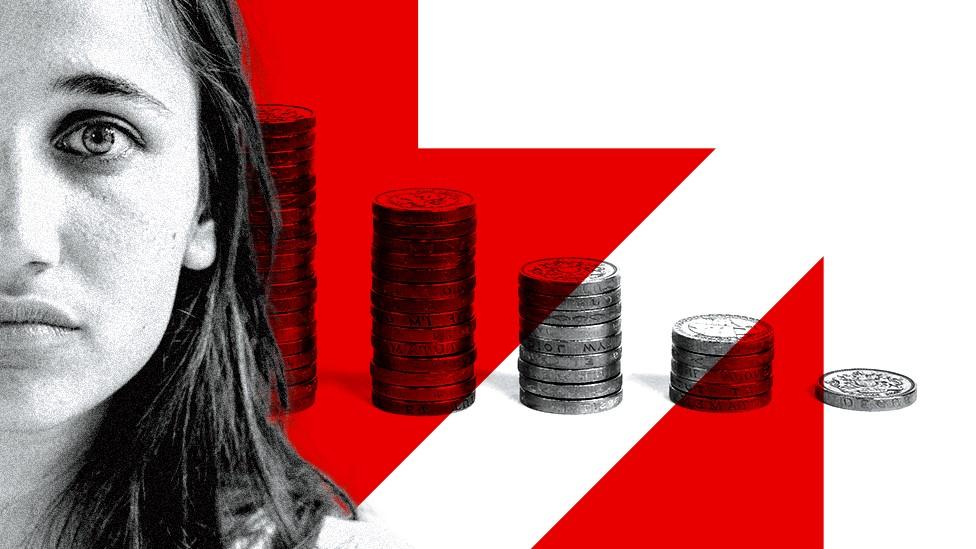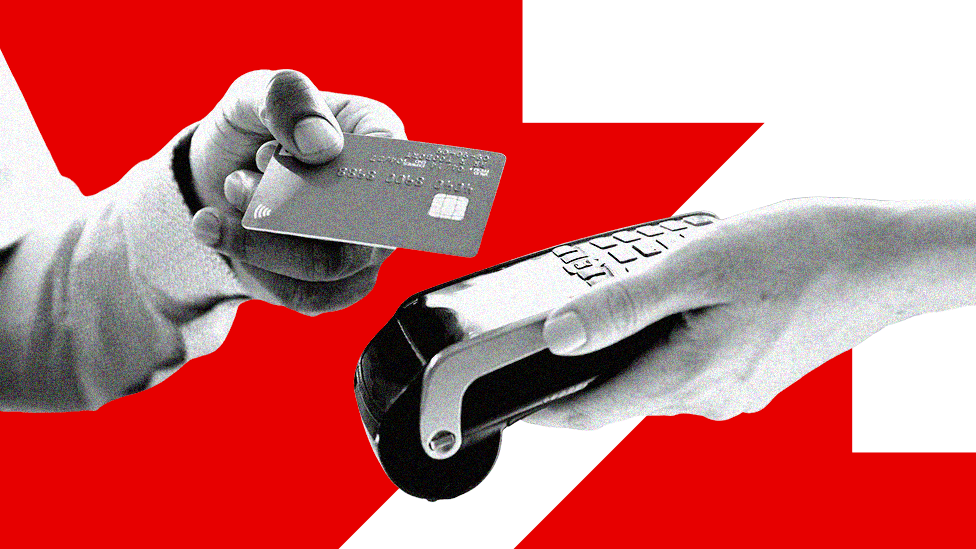UK economy: Shoppers splashing out boosts economy in January
- Published
- comments

The UK economy picked up in January, raising hopes it could be on its way out of recession.
The economy grew by 0.2%, official figures show, boosted by sales in shops and online and more construction activity.
The Office for National Statistics (ONS) said the services sector led the improvement.
This is an early estimate, but signals how the UK, which entered recession at the end of 2023, is faring.
The new figures on Wednesday, external were in line with what economists were expecting.
Some experts said it could suggest the economy may be turning a corner after dipping into recession at the end of last year.
The services sector, which also includes things like hairdressing and hospitality, grew by 0.2% in January. It was the biggest contributor to the monthly rise overall, helped along by a strong performance on the High Street and spending in supermarkets.

It marks an improvement on the 0.1% decline in output seen in December as retailers failed to draw in shoppers who had opted to spend their money in earlier sales in the run-up to Christmas.
Department stores, household good and sports equipment shops, external had already reported a boost due to January sales promotions.
Noureddine Mouatassime is the owner of Artisan Stories, a home and interior store in Brixton, south London. He makes handmade leather bags in a studio in Morocco, but says a change in his customers' habits hit trade.
He once employed 11 people to make the bags but he has had to lay off all but one.

"Before Covid, people would buy without even thinking twice," he told the BBC. "Now they need to think a lot to buy something. They buy only what they need."
A big January sale helped bring in custom, but he said it had eaten into his small business's profits.
Liz McKeown, director of economics statistics at the ONS, said: "The economy picked up in January with strong growth in retail and wholesaling."
"Construction also performed well with housebuilders having a good month, having been subdued for much of the last year."
But these areas of growth were offset by falls in TV and film production, legal services and the pharmaceutical industry which can be quite volatile.
In the three months to the end of January, the production sector, which also includes manufacturing, fell by 0.2% and services were flat.
Further industrial action across the NHS and the rail industry may have dampened growth too, the ONS said, alongside the long-running impact of the Screen Actors Guild strikes in America, which wrapped up in December.
Ms McKeown said: "Over the last three months as a whole, the economy contracted slightly."
People spending less, doctors' strikes and a fall in school attendance dragged the UK into a recession at the end of 2023.
The economy shrank by 0.3% between October and December, after it had already contracted between July and September. The UK is in recession if it fails to grow for two successive quarters.
Growing the economy was one of five key pledges that Prime Minister Rishi Sunak made last year as consumers and businesses were squeezed by higher prices and interest rates.
Most economists, politicians and businesses like to see gross domestic product (GDP) rising steadily because it usually means people are spending more, extra jobs are created, more tax is paid and workers get better pay rises.
Responding to the latest figures, Chancellor Jeremy Hunt said: "While the last few years have been tough, today's numbers show we are making progress in growing the economy - part of which makes it possible to bring down national insurance contributions by £900 this coming year.
"But if we want the rate of growth to pick up more we need to make work pay which means ending the unfairness of taxing work twice."
'A mixed picture'
Shadow chancellor Rachel Reeves, however, said that Britain remains "worse off" and that Prime Minister Rishi Sunak's claims that his plan for the economy is working are "already in tatters".
Suren Thiru, economics director at the Institute of Chartered Accountants in England and Wales, cautioned that a more muted performance could follow in February, with wet weather potentially keeping shoppers indoors.
He added that the squeeze from higher interest rates and persistent labour shortages could mean that the economic recovery "is more downbeat" than the government's financial watchdog, the Office for Budget Responsibility (OBR) is predicting.
Coinciding with what could be the chancellor's last Budget before a General Election, the OBR said that it expects the UK economy will grow by 0.8% this year, with inflation forecast to fall below the Bank of England's target of 2% by the end of June.
However, the ongoing of impact of higher interest rates which are aimed at slowing spending and bringing prices down, paired with weak investment by firms and in the public sector, could hold the economy back in the longer-term, Yael Selfin, chief economist at KPMG UK said.
Other countries' economies have also struggled with energy price shocks and supply chain delays in the wake of the pandemic driving up costs, but the UK has seen growth stagnating for some time.
Speaking to the BBC's Today programme on Wednesday, Liz McKeown from the ONS said that its survey of 40,000 firms showed that more than one in five companies did expect turnover to go up in March though.
While she said that businesses were telling them of a "mixed picture" ahead, "there are some signs of optimism".
Related topics
- Published10 May 2024

